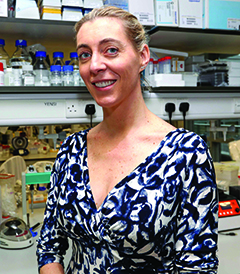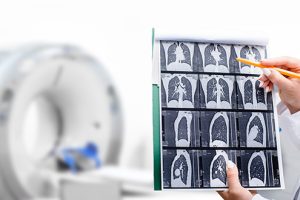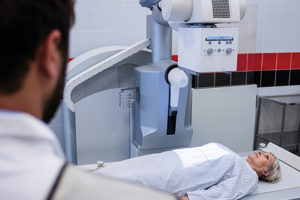Two new clinical studies are investigating how genetic markers found in breath and blood can be used to predict risks of lung cancer recurrence and improve treatment.

Prof. Bryan Hennessy
The two studies are to receive funding through Breakthrough Cancer Research.
The first research study, by Prof. Bryan Hennessy from the Royal College of Surgeons in Ireland (RCSI), is to analyse the breath of lung cancer survivors to detect genetic mutations that could predict the probability of a future recurrence of the disease.
Currently, the only way of predicting recurrence is through invasive biopsies, which cannot be performed frequently due to patient health risks, and blood sampling, which is not fully reliable as it only has a one in five accuracy prediction rate.
This new method of testing breath samples had outperformed blood-based testing to date and the study is to investigate its capabilities further.
The aim of the research, “The utility of exhaled breath condensate to detect sub-clonal mutations in early stage lung adenocarcinoma” is to complement the current blood-based detection approach to provide a better overall picture, help determine the best treatment options, and ultimately improve outcomes for lung cancer patients. This project is to be jointly funded with the Health Research Board (HRB).

Dr Dearbhaile Collins.
Photo: Jim Coughlan.
The second study, which is being led by Dr Dearbhaile Collins, a Consultant Medical Oncologist in Cork University Hospitality (CUH), measures genetic markers in the blood of patients linked to an aggressive form of small cell lung cancer with very poor survival rates.
Small cell lung cancer makes up approximately 15 per cent or about one in seven of the lung cancers diagnosed in Ireland and studies have shown that almost one in four patients with small cell lung cancer have a higher level of the cancer-causing gene, MYC.
Detection of MYC may therefore open up the possibility of clinical trials with novel MYC-targeting compounds.
The research team led by Dr Collins is collecting blood samples from patients when they are first diagnosed with small cell lung cancer and test for MYC gene levels before the patient starts anti cancer treatment.
Using blood samples, or ‘liquid biopsy’ instead of taking a tumour biopsy, minimises potential harm to patients and the MYC gene analysis is to inform doctors’ understanding of how to best treat patients and potentially identify new approaches for patients that specifically target the MYC compounds.
This study is a collaboration with Cork University Hospital, the HRB Clinical Research Facility-Cork and the Institute of Cancer Research, Royal Marsden Hospital Trust, London.
“This research will increase our understanding of the role of the MYC gene in small cell lung cancer. It is hoped that this research will help to identify patients with different risks of cancer progression,” said Dr Collins.
 Irish Medical Times Medical News for Healthcare Professionals
Irish Medical Times Medical News for Healthcare Professionals



